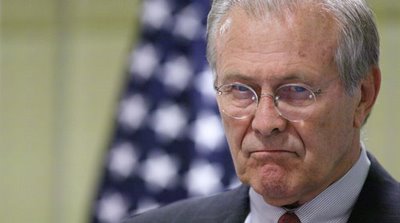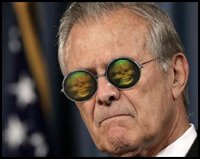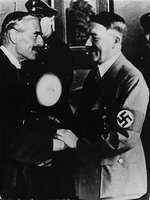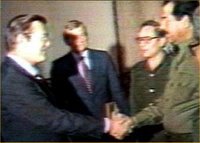Rummy's Bully Pulpit

The great respect that I have for your leadership, Mr. President, in this little understood, unfamiliar war, the first war of the 21st century -- it is not well-known, it was not well-understood, it is complex for people to comprehend. And I know, with certainty, that over time the contributions you've made will be recorded by history.
Not at all. If you think . . . the area in the south and the west and the north that coalition forces control is substantial. It happens not to be the area where weapons of mass destruction were dispersed. We know where they are. They're in the area around Tikrit and Baghdad and east, west, south and north somewhat. . . .
I don't know what the facts are but somebody's certainly going to sit down with him and find out what he knows that they may not know, and make sure he knows what they know that he may not know.
As you know, you go to war with the army you have, not the army you might want or wish to have at a later time.
I believe what I said yesterday. I don't know what I said, but I know what I think, and, well, I assume it's what I said.
 I would not say that the future is necessarily less predictable than the past. I think the past was not predictable when it started.
I would not say that the future is necessarily less predictable than the past. I think the past was not predictable when it started.There's another way to phrase that and that is that the absence of evidence is not the evidence of absence. It is basically saying the same thing in a different way. Simply because you do not have evidence that something does exist does not mean that you have evidence that it doesn't exist.
I'm not into this detail stuff. I'm more concepty.
I don't do quagmires. I don't do diplomacy. I don't do foreign policy. I don't do predictions. I don't do numbers. I don't do book reviews.
Now, settle down, settle down. Hell, I'm an old man, it's early in the morning and I'm gathering my thoughts here.
If I know the answer I'll tell you the answer, and if I don't, I'll just respond, cleverly.
Learn to say 'I don't know.' If used when appropriate, it will be often.
If I said yes, that would then suggest that that might be the only place where it might be done which would not be accurate, necessarily accurate. It might also not be inaccurate, but I'm disinclined to mislead anyone.
Reports that say that something hasn't happened are always interesting to me, because as we know, there are known knowns; there are things we know we know. We also know there are known unknowns; that is to say we know there are some things we do not know. But there are also unknown unknowns -- the ones we don't know we don't know.
Is our current situation such that ‘the harder we work, the behinder we get?’
That's what a day in a war brings. People die. Later that day you ask the Senate for appropriations.
 There are going to be days when large numbers of people are going to be killed. If people don't die, then it's not much of a war, is it? Then it would be kind of like a strenuous disagreement.
There are going to be days when large numbers of people are going to be killed. If people don't die, then it's not much of a war, is it? Then it would be kind of like a strenuous disagreement.I could do that in any city in America. Think what's happened in our cities when we've had riots and problems and looting. Stuff happens! Freedom's untidy, and free people are free to make mistakes, and commit crimes, and do bad things.
I guess the reason I don't use the phrase "guerrilla war" is because there isn't one. And it would be a misunderstanding and a miscommunication to you and to the people of the country and the world.
These past years -- six years -- it's been quite a time. It recalls to mind the statement by Winston Churchill, something to the effect that, "I have benefited greatly from criticism, and at no time have I suffered a lack thereof."



